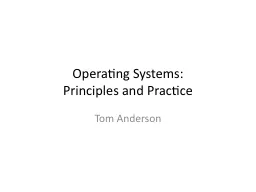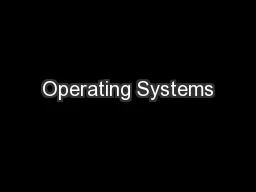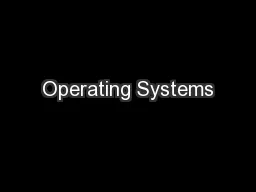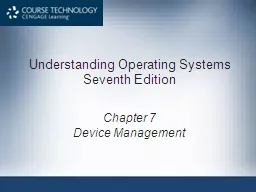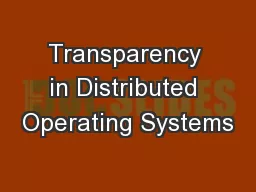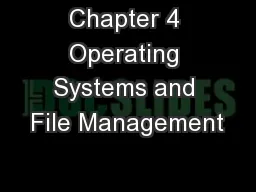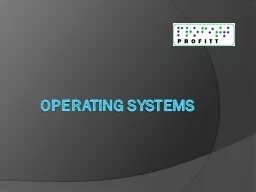PPT-Operating Systems Should Provide Transactions
Author : mitsue-stanley | Published Date : 2015-09-27
Donald E Porter and Emmett Witchel The University of Texas at Austin Example browser plugin upgrade 2 write new plugin binary start browser old config old plugin
Presentation Embed Code
Download Presentation
Download Presentation The PPT/PDF document "Operating Systems Should Provide Transac..." is the property of its rightful owner. Permission is granted to download and print the materials on this website for personal, non-commercial use only, and to display it on your personal computer provided you do not modify the materials and that you retain all copyright notices contained in the materials. By downloading content from our website, you accept the terms of this agreement.
Operating Systems Should Provide Transactions: Transcript
Donald E Porter and Emmett Witchel The University of Texas at Austin Example browser plugin upgrade 2 write new plugin binary start browser old config old plugin arguments corrupt data files. 1. 11. I/O Systems. 11.1 Basic Issues in Device Management. 11.2 A Hierarchical Model. 11.3 I/O Devices. 11.4 Device Drivers. Memory-Mapped . vs. Explicit Device Interfaces . Programmed I/O with Polling . 1. 10. File Systems. 10.1 Basic Functions of File Management. 10.2 Hierarchical Model of a File System . 10.3 User’s View of Files. Logical File Organization. Operations on Files. 10.4 . File Directories. Principles and Practice. Tom Anderson. How This Course Fits in the UW CSE Curriculum. CSE 333: Systems Programming. Project experience in C/C++. How to use the operating system interface. CSE 451: Operating Systems. 1. 4. The OS Kernel. 4.1 Kernel Definitions and Objects. 4.2 Queue Structures. 4.3 Threads. 4.4 Implementing Processes and Threads. Process and Thread Descriptors. Implementing the Operations. 4.5 Implementing Synchronization and Communication Mechanisms. 1. 5. Process and thread scheduling. 5.1 Organization of Schedulers . Embedded and Autonomous Schedulers . . 5.2 Scheduling Methods . A Framework for Scheduling . Common Scheduling Algorithms . Seventh Edition. Chapter 7. Device Management. Learning Objectives. After completing this chapter, you should be able to describe:. Features of dedicated, shared, and virtual devices. Concepts of blocking and buffering, and how they improve I/O performance. Sig Freund. CSC 8320 Fall . 2008. rfreund1@student.gsu.edu. Transparency in Distributed Operating Systems. Evolution of Modern Operating Systems. Centralized operating system. +network access and resource sharing. Special rules due to the nature of the asset. Each shareholding in a company purchased on a separate date is treated as the acquisition of a separate asset for CGT purposes. The principle of first in/ first out (FIFO) applies to the disposal of shares of the same class. Dr . Damitha. . Karunaratna. . University of Colombo school of computing. Topics to discuss. What is an operating system(OS)?. Main objectives of an OS. Main functions of an OS. Evolution of OS.. and File Management. Chapter 4: Operating Systems and File Management. 2. Chapter Contents. Section A: Operating System Basics. Section B: Today’s Operating Systems. Section C: File Basics. Section D: File Management. Sig Freund. CSC 8320 Fall . 2008. rfreund1@student.gsu.edu. Transparency in Distributed Operating Systems. Evolution of Modern Operating Systems. Centralized operating system. network access and resource sharing. Chapter Contents. Section A: Operating System Basics. Section B: Today’s Operating Systems. Section C: File Basics. Section D: File Management. Section E: Backup Security. Chapter 4: Operating Systems and File Management. Operating systems (OS) can help computer users do many things, like managing and manipulating files and folders.. Operating systems also provide users the ability to control hardware components of a computer and its peripheral devices, like printers and scanners.. kindly visit us at www.examsdump.com. Prepare your certification exams with real time Certification Questions & Answers verified by experienced professionals! We make your certification journey easier as we provide you learning materials to help you to pass your exams from the first try. Professionally researched by Certified Trainers,our preparation materials contribute to industryshighest-99.6% pass rate among our customers.Just like all our exams.
Download Document
Here is the link to download the presentation.
"Operating Systems Should Provide Transactions"The content belongs to its owner. You may download and print it for personal use, without modification, and keep all copyright notices. By downloading, you agree to these terms.
Related Documents



